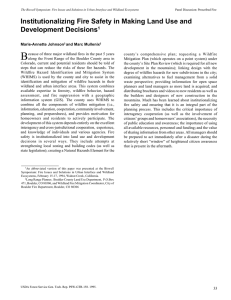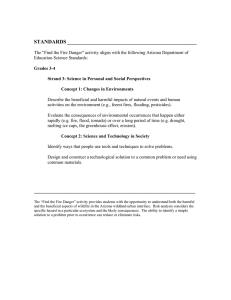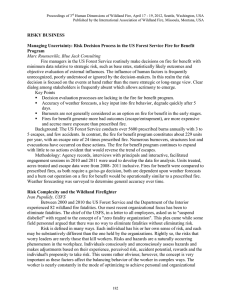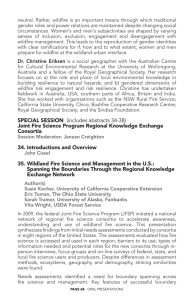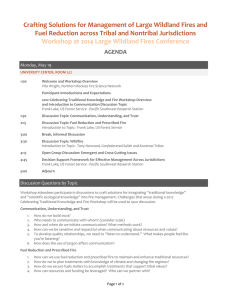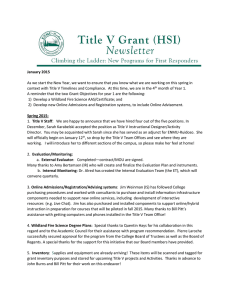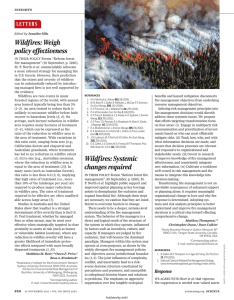TENTATIVE SCHEDULE - As of April 6, 2010 M d A
advertisement
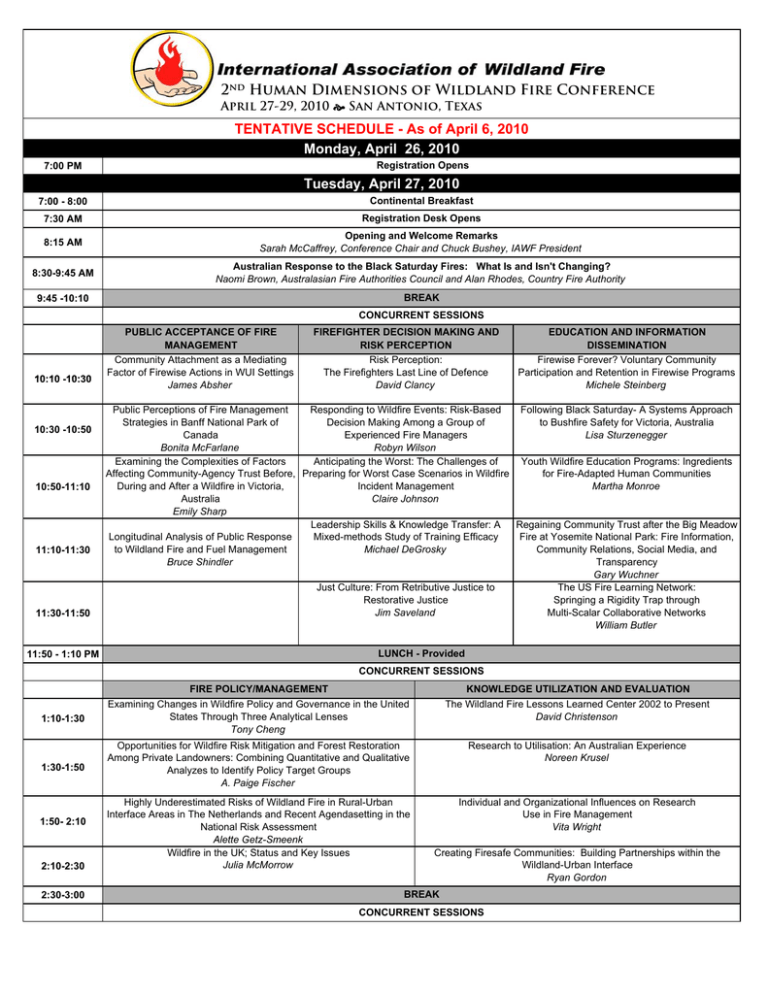
2nd Human Dimensions of Wildland Fire Conference April 27-29, 2010 [ San Antonio, Texas TENTATIVE SCHEDULE - As of April 6, 2010 M d Monday, April A il 26, 26 2010 Registration Opens 7:00 PM Tuesday, April 27, 2010 Continental Breakfast 7:00 - 8:00 7:30 AM Registration Desk Opens 8:15 AM Opening and Welcome Remarks Sarah McCaffrey, Conference Chair and Chuck Bushey, IAWF President 8:30-9:45 AM Australian Response to the Black Saturday Fires: What Is and Isn't Changing? Naomi Brown, Australasian Fire Authorities Council and Alan Rhodes, Country Fire Authority BREAK 9:45 -10:10 CONCURRENT SESSIONS 10:10 -10:30 10:30 10:30 -10:50 10:50-11:10 11:10-11:30 11 30 11 50 11:30-11:50 PUBLIC ACCEPTANCE OF FIRE MANAGEMENT Community Attachment as a Mediating Factor of Firewise Settings acto o e se Actions ct o s in WUI U Sett gs James Absher FIREFIGHTER DECISION MAKING AND RISK PERCEPTION Risk Perception: The e Firefighters e g te s Last ast Line eo of Defence e e ce David Clancy EDUCATION AND INFORMATION DISSEMINATION Firewise Forever? Voluntary Community Participation a t c pat o and a d Retention ete t o in Firewise e se Programs og a s Michele Steinberg Following Black Saturday- A Systems Approach Responding to Wildfire Events: Risk-Based Public Perceptions of Fire Management to Bushfire Safety for Victoria, Australia Decision Making Among a Group of Strategies in Banff National Park of Lisa Sturzenegger Experienced Fire Managers Canada Robyn Wilson Bonita McFarlane Examining the Complexities of Factors Anticipating the Worst: The Challenges of Youth Wildfire Education Programs: Ingredients Affecting Community-Agency Trust Before, Preparing for Worst Case Scenarios in Wildfire for Fire-Adapted Human Communities During and After a Wildfire in Victoria, Incident Management Martha Monroe Claire Johnson Australia Emily Sharp Leadership Skills & Knowledge Transfer: A Regaining Community Trust after the Big Meadow Longitudinal Analysis of Public Response Mixed-methods Study of Training Efficacy Fire at Yosemite National Park: Fire Information, to Wildland Fire and Fuel Management Michael DeGrosky Community Relations, Social Media, and Bruce Shindler Transparency Gary Wuchner The US Fire Learning Network: Just Culture: From Retributive Justice to Springing a Rigidity Trap through Restorative Justice Jim S Saveland Multi-Scalar Ji l d M lti S l Collaborative C ll b ti Networks N t k William Butler LUNCH - Provided 11:50 - 1:10 PM CONCURRENT SESSIONS FIRE POLICY/MANAGEMENT KNOWLEDGE UTILIZATION AND EVALUATION 1:10-1:30 Examining Changes in Wildfire Policy and Governance in the United States Through Three Analytical Lenses Tony Cheng T Ch The Wildland Fire Lessons Learned Center 2002 to Present David Christenson Research to Utilisation: An Australian Experience Noreen Krusel 1:30-1:50 Opportunities for Wildfire Risk Mitigation and Forest Restoration Among Private Landowners: Combining Quantitative and Qualitative Analyzes to Identify Policy Target Groups A. Paige Fischer Highly Underestimated Risks of Wildland Fire in Rural-Urban Interface Areas in The Netherlands and Recent Agendasetting in the National Risk Assessment Alette Getz-Smeenk Wildfire in the UK; Status and Key Issues Julia McMorrow Individual and Organizational Influences on Research Use in Fire Management Vita Wright 1:50- 2:10 2:10-2:30 2:30-3:00 Creating Firesafe Communities: Building Partnerships within the Wildland-Urban Interface Ryan Gordon BREAK CONCURRENT SESSIONS 3:00-3:20 3:20 3:40 3:20-3:40 3:40-4:00 4:00-4:20 4:20-4:40 SPECIAL SESSION: AN INTERDISCIPLINARY AND ORGANIZATIONAL PERFORMANCE COMMUNITY RESILIENCE APPROACH TO UNDERSTANDING THE INTERPLAY OF FIRE POLICY, INCIDENT STRATEGY, AND INCIDENT OUTCOMES Citizen Acceptance of Post-Fire Management Strategies: Community Introduction Responses After Two Large Fires in Oregon Sarah McCaffrey Christine Olsen Are Less Aggressive Strategies Cheaper? Krista Gebert g CWPPs to the Test Trial byy Fire--Putting Pamela Jakes and Victoria Sturtevant What’s Really Driving Suppression Response – Public or Agency Pressure? Incorporating Adaptive Capacity into Existing Concepts of Toddi Steelman Hazard Vulnerability and Resilience: What Social Characteristics Lead to Fire Adapted Human Communities? Costs from the Stakeholder’s Perspective Matthew Carroll Chris Stalling Lessons Learned from Wildfire-Affected Rural Communities in New Zealand E.R. (Lisa) Langer Key Decisions in Incident Management from the Incident Management Team’s Perspective Anne Black Community Resiliency as a Response to Wildfires: Canadian Case Examples Judith Kulig Opportunities for Understanding Incident Management Through a Multi-Disciplinary Lens Sarah McCaffrey with Krista Gebert, Chris Stalling, Anne Black and Toddi Steelman 4:40 Conference adjourns for the day 5:30 - 7:00 PM POSTER PRESENTATIONS AND SOCIAL RECEPTION Wednesday, April 28, 2010 Continental Breakfast 7:00 - 8:00 8:20 - 8:30 Opening Remarks - Announcements 8:30-9:45 When the Incident Doesn’t End: Life in the Grinder The Experiences of a State Agency Tasked with Managing Multiple Long-Duration Incidents and the Impact on its Personnel Mark Stanford, Texas Forest Service 9 45 10 10 9:45-10:10 BREAK CONCURRENT SESSIONS 10:10-10:30 10:30-10:50 10:50- 11:10 11:10-11:30 11:30-11:50 SOCIAL ACCEPTANCE - DEFENSIBLE SPACE Understanding Risk Mitigation in the Western US Wade Martin FIREFIGHTER DECISION MAKING PRESCRIBED FIRE Identifying Risk Factors for Injury in Wildland Fire Carla Britton Facilitating Prescribed Fire through Communication with Air Quality Regulators: Sequoia and Kings Canyon National Parks Deb Schweizer Socio-Economics of Ranching and Ecological Prescribed Fire On Refugio-Goliad Prairie, Texas Ray Guse Living with Wildfire in Colorado: A Survey of Two Front Range Counties Hannah Brenkert-Smith Decision Making Processes Processes, Decision Support Systems, and Standard Operating Guidelines Patrick Withen Homeowners and Defensible Space: Motivation to Maintain and the Role of Local Programs Sarah McCaffrey Combining Social Science and Economics: The Effect of Newspaper Coverage and Political Pressure on Wildland Fire Suppression Costs Krista Gebert Learning and Training on the Use of Prescribed Burning Techniques in Southern Europe Maria Colaco Defensible Features: Impact D f ibl Space S F t I t off Voluntary Versus Mandatory Programs on a Homeowner's Attitudes and Actions Christine Vogt Changes in Southern California Landowner Attitudes and Behaviors About Forest Health and Fire Safety After Participation in Cost-Share Fuels Reduction Program Allison Roth Can C you Define D fi Acceptable A t bl Risk Ri k in i Wildland Wildl d Firefighting? David Clancy Whatt D Do Th They Thi Thinkk Of B Burning Wh i In I Texas? T ? Mark Moseley Advancing Fire Management Program Effectiveness through Improved Decision Making Tom Zimmerman LUNCH - Provided 11:50-1:00 PM CONCURRENT SESSIONS EVACUATION AND ALTERNATIVES SPECIAL SESSION: BEYOND THE BASICS: EMERGING AND UN- OR UNDER- UTILIZED METHODOLOGIES AND WHAT THEY CAN REVEAL 1:00-1:20 Improving an Inherently Stressful Situation: The Role of Communication During Wildfire Evacuations Sarah McCaffrey 1:20-1:40 Development of Alternatives to Evacuation in the Wildland Urban Interface: Does Emerging Practice Reflect Community Diversity? Travis Paveglio Understanding Information Flows During Wildfires: Methodological Insights from Social Network Analysis Branda Nowell and Toddi Steelman Theory of Human Performance: From Post-Traumatic Stress Disorder to Elite Athletes James Saveland 1:40-2:00 2:00-2:20 Materiality and Communication in HROs Jody R h Results R lt from f th 2009 "Black "Bl k Saturday" S t d " Bushfires: B hfi H J d Jahn J h Research the Human Behaviour and Community Safety Issues Safety in Wildland Fire: Leadership, Employee Voice and the Application Joshua Whittaker of Mindfulness for Future Research Alexis Lewis BREAK 2:20-2:40 CONCURRENT SESSIONS EVACUATION AND ALTERNATIVES (cont (cont.)) 2:40-3:00 3:00-3:20 3:20-3:40 3:20 3:40 3:40-4:00 Public Response to the Threat of Wildfire Alan Rhodes Clarifying Evacuation Options Through Fire Behavior and Traffic Modeling Carol Rice Understanding Homeowner Preparation and Intended Actions When Threatened byy a Wildfire Sarah McCaffrey SPECIAL SESSION: ORGANIZATIONAL CHANGE, CHANGE CONTINUOUS LEARNING LEARNING, AND MANAGING ADAPTIVELY Managing Adaptively to Improve Policy: Challenges and Opportunities for Integrating Science, Policy and Decision Making Toddi Steelman Continuous Improvement in Decision-making in Fire Management Marc Rounsaville Research Results Results, Challenges and Opportunities from 2008 and 2009 Fire Seasons Anne Black and Toddi Steelman Understanding “Ready, Set, Go!” Outreach – The Orange County Experience Laura Blaul Discussion Branda Nowell 4:00- ? "Birds of a Feather" Sessions 6:30 - 9:30 Optional Evening Activity - A "Night on the Town" at the Riverwalk (Transportation will be provided) Thursday, April 29, 2010 7:00 - 8:00 Continental Breakfast 8:20-8:30 Opening Remarks - Announcements 8:30-9:45 Closing the Science-Practice Gap: Lessons Learned from Collaboration Between Research and Practice in Community Wildfire Protection Planning Daniel R. Williams, U.S. Forest Service, Rocky Mountain Research Station, Pam Jakes, U.S. Forest Service, Northern Research Station, and Judy Serby, Colorado State Forest Service 9:45 -10:00 BREAK CONCURRENT SESSIONS MITIGATION AND FIRE MANAGMENT FIRE MANAGEMENT Integrating Socioeconomic and Biophysical Processes in a Coupled Landscape Planning Model Max Nielsen-Pincus Exploring the Meanings and Significance of Living with Wildfire in the Rural West: The “Lived Experience” of Everyday Interactions Between Firefighters and WUI Community Members Tanner Hartman and Chuck Harris 10:20-10:40 A Unique Wildfire Risk Reduction Program in an Aboriginal Community: Peavine FireSmart Projects Amy Christianson Choice Matters: Bureaucratic Discretion in Hazardous Fuels Reduction on National Forests Ellen Donoghue 10:40-11:00 Learners: Understandings of the Social Construction of Trust and Its Implications for the Practice of Fire Management Margarida Washburn Securing the Human Perimeter: Beyond Operational Approaches to Managing Community Fire Safety Simone Blair 11:00-11:20 Public Views and Attitudes Concerning Managed Fire and Fuels Reduction Strategies in the Valles Caldera National Preserve (VCNP), New Mexico Carol Raish Using Stewardship Contracting to Reduce Hazardous Fuels:Choices from the Field Cassandra Moseley 10:00-10:20 11:20-12:00 PM CLOSING REMARKS
